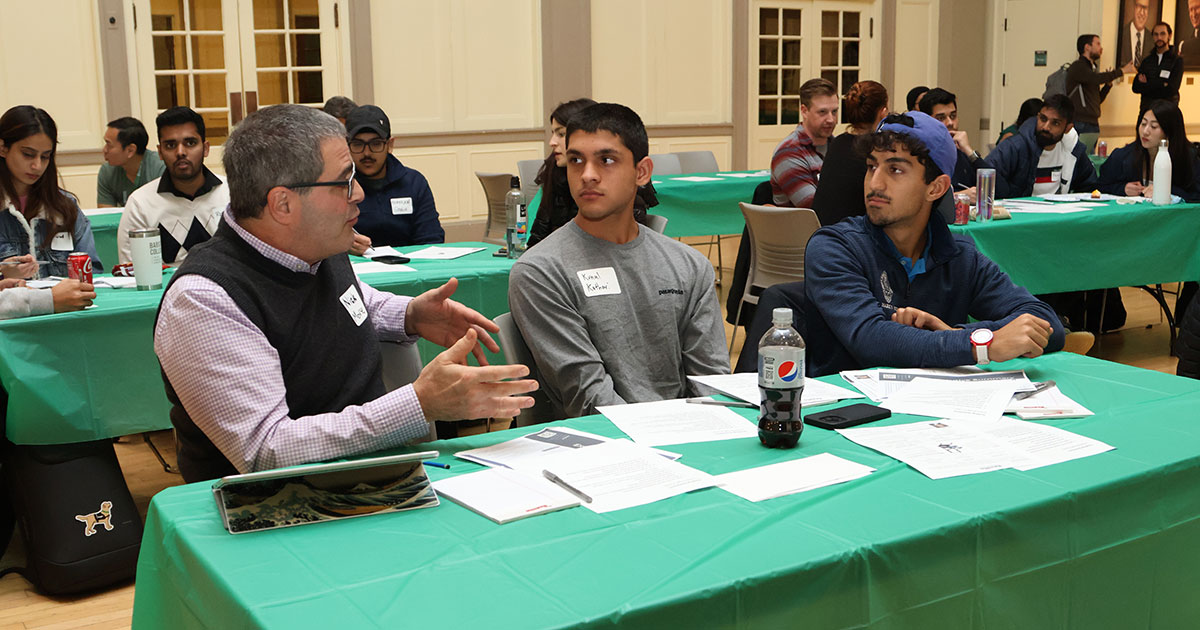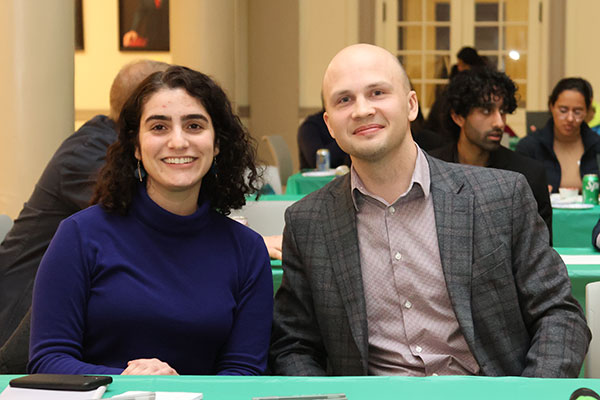When Healthcare Startups and Investors Come Together

Health care was the matter at hand as entrepreneur Barbara Pinto MS’24 stood in front of a panel of investors. Armed with a PowerPoint and a microphone, she began her pitch.
Pinto spoke of her venture, NestSaúde, an integrated digital healthcare platform in her native Brazil. She spoke of the need for the platform, how it stores patient info and leverages artificial intelligence to enable preventative medicine.
She even spoke of her experiences with the Brazilian healthcare system when she was 10, when her mother was diagnosed with cancer and Pinto accompanied her to many, many doctor’s visits. “I was right by her side,” she said.
Then when the presentation was done, the questions started. They were pointed and probing, the questions coming not only from the investors but from an audience in attendance. People asked about the privacy of patient info and the investment that Pinto was seeking and the uniqueness of what her platform offered.
One by one, the questions came, and one by one, Pinto answered them. “This was helpful,” she said afterward. “It made me rethink a couple of things and how to improve my pitch.” Specifically, she realized that she needed to do a better job describing the challenges of Brazilian health care. “I am trying to explain something that is alien to the American reality,” she said.
Understanding Healthcare Investors
Pinto presented during a Babson College event that, billed as a roundtable on evaluating healthcare startups, offered a peek at entrepreneurship’s role in health and the interplay between healthcare investors and entrepreneurs.

As entrepreneurs discussed their ventures, a panel of investors gave their feedback. The audience filled with Babson students was encouraged to do the same. “Think of yourself as a healthcare VC,” Iman Bendarkawi ’19, MBA’24, told the audience.
A member of a private equity and venture capital student group at Babson, Bendarkawi served as the MC for the event, which was part of the College’s celebration of Global Entrepreneurship Week, a global campaign to applaud and empower entrepreneurs.
While Babson students and alumni are certainly experts in entrepreneurship, the event’s focus on healthcare startups and investors spotlighted a vital and growing industry that they may have less experience with. The size of the healthcare sector, and the need and opportunity it presents, is hard to ignore. According to the Centers for Medicare and Medicaid Services, $4.3 trillion was spent on healthcare expenditures in 2021, a number that is only expected to grow.
“I think the future of many industries today will be in the healthcare sector,” Bendarkawi said. Before returning to Babson for her MBA, she worked in tech strategy consulting and was surprised by the amount of money and innovation targeting health care. “The sheer amount of growth that is happening there—it needs to be top of mind,” she said.
A Pitch from a Healthcare Startup
Another entrepreneur pitching at the event was Aleksandr Malashchenko MBA’24, founder of ReviMo, which has developed a mobility device that uses remote control and automated seating to help those with impairments to move independently around the house. “We believe independent mobility is a fundamental human right,” Malashchenko said.

Malashchenko spoke of starting ReviMo after helping his grandfather recover from a stroke that caused severe paralysis. “It was painful and embarrassing for him to ask for help,” Malashchenko said. “He always wanted to regain his independence and dignity.” Using his experience in research and development and mechanical engineering, Malashchenko decided to create a device that could help people like his grandfather.
As with Pinto, Malashchenko was subject to rigorous questions, with healthcare investors and audience members asking about manufacturing, pricing, and insurance reimbursements. Malashchenko, though, welcomed their inquiries.
“Pitching is a part of entrepreneurship. We have to do pitches every day,” he said. “Their tough questions are helping us to prepare.”
Held at Babson’s Knight Auditorium, the roundtable event was organized by three Babson organizations: the Graduate PE/VC Group, the Graduate Healthcare and Life Sciences Club, and the Kerry Murphy Healey Center for Health Innovation and Entrepreneurship.
Wiljeana Glover, the KMH Center’s founding faculty director, said she hoped the event helped Babson students to better understand that the value of healthcare startups extends beyond a monetary bottom line.
“I hope people take away the importance of health ventures to not only achieve economic value, but also to understand what this contributes clinically,” said Glover, the Stephen C. and Carmella R. Kletjian Foundation Distinguished Professor of Global Healthcare Entrepreneurship at Babson.




